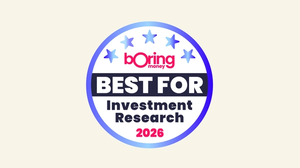Holly's View: How and what should I invest in for the best returns?
By Boring Money
3 Dec, 2024
Our Founder & CEO Holly Mackay tackles a reader question about where to invest in a lump sum for the best returns. Her thoughts? Do your research, don't try to be too clever too soon, and take a long-term view! This is a common question amongst our readers, so if you're also on the lookout for some investment guidance, scroll down for Holly's full response below.
Hi,
I have a substantial amount to invest in investment trusts and ETFs. There are thousands to choose from so do you have any methods of selection you would choose to whittle it down?
I am new to this and I know there are ready-made funds that you publish every month, which I would consider. I also note you publish the best-selling funds each month from AJ Bell, Fidelity, Hargreaves and ii both of which would be of interest in looking for where to invest.
The site BestInvest also has an excellent platform to list the top Funds/ETFs performance over 1, 3 and 5 years which is another great guide.
This is Money also has a Power Portfolio which is of interest, and also recently published on 19.9.24 a list of tips in various types of Fund, i.e. Cautious (7), Global (11), Bonds (7), UK Companies (7), Income (4), Emerging markets (5), Adventurous (8). Would it be wise to maybe select a basket from these types?
Trustnet also has a list of Top 10 fund managers some (but not many) of which cross match with the Funds in the lists above which is a little confusing why they are not prominent in most lists.
Is the FT website useful in Fund/ETF selection in your opinion?
Generally when selecting a Fund/ETF would you look at the 1 year % performance as a benchmark for selection, and diversify across say, as an example, the This Is Money types of Funds Cautious (7), Global (11), Bonds (7), UK Companies (7), Income (4), Emerging markets (5), Adventurous (8)? Then how do we fit in the other tips/lists mentioned above?
I really would appreciate an insight into how you would go about this if it was your money you were investing, as I feel that anything I could achieve > 6% net overall would be worthwhile as savings rates are falling.
Gosh Geoff, you have done a LOT of research. Good for you! Everything you say sounds pretty sensible to me and you’ve looked in all the right sorts of places. My main concern would actually be that you run the risk of overcomplicating things, and maybe looking to so many ‘advisers’ that you hedge your bets, spread everything around too thin, and so undo the work of Option 1 by putting half with Option 2 – and if you do this with lots of players, of course they can all cancel each other out.
I know a lot of people have your type of question so I’m going to unpack this all in some detail below.
Things to consider before you invest
Who should you use to research investments?
First – the sources. I would typically listen to the research professionals at investment firms, advice firms or funds managers, over the content producers at newspapers or publishers. When papers put together their lists, I do wonder about the strength of financial resources and experience which underpin this.
Every month we look at the best-selling funds on main platforms. This is of course rearview mirror stuff and doesn’t anticipate or look forward. Its use also depends on whether you believe in the wisdom of crowds – or the folly of crowds. However, I do think it’s an interesting gauge of what everyone else is up to. It also indicates some popular funds or ETFs to buy, which will be large and liquid, if you know which markets you want to get exposure to and just want a decent mainstream option. So, for example, the Vanguard S&P 500 ETF is on this. If you want to invest in the main US index and just get the average collection of shares without the bets of active management, in a low-cost way, this is a pretty solid way to do so.
OK, now let’s get a bit more specific.
What assets should you invest in?
The first decision we all need to make is really our ‘asset allocation’. What mix of shares, bonds, property, cash, etc do we want? This will typically depend on your timeframe. 10 years plus? Most people would look almost exclusively at shares. Whereas interest rates are still not bad and cash is certain, so people with a 2-year horizon might look only at cash. Some people will just want their money to keep up with inflation, so that could be a mix of cash, bonds and shares. If you need help thinking about this, have a look at some of the ‘robo advisers’ such as Nutmeg, for example, and take their ‘risk profiler’. It will give you a sense of how to translate what you want into industry-speak about ‘risk profiles’. Which typically spit out a suggested asset allocation for you.
I would say that if you would like to earn 6% or more a year, on average, you will probably need to look at mostly shares (or equities) as bonds won’t make this much, unless you go for spicier corporate bonds.
Do you want an income from your investments?
Another thing to consider is whether you need your investments to give you an income. This is often the case for those in retirement, for example. In which case, you would look at income-producing investments and see what ‘yield’ they are paying. There are some decent investment trusts in our best-selling lists which pay good dividends at the moment. Whereas if you are in accumulation mode, you will not want to take income or money out, just to save as much as possible. This would lead you to look at the Accumulation (or ‘Acc’) version of any funds.
What not to do when you start investing
Don’t forget to consider independent research
Once you know about where to research, your preferred asset allocation, and income requirements, you are ready to look at funds.
I think the main investment platforms’ shortlists are a very good place to start. Have a look at the asset classes or regions or types of funds you like. See what they say. And have a look at a couple. Is the fund you like a favourite of a few analysts? I do think there can be strength in numbers. And for a final check, see what independent research firms like Morningstar or Trustnet think. How do they rate it?
You ask me what I would do if it were my money. You have a substantial amount to invest Geoff. And you are new to this. That makes me nervous.
Don't overcomplicate it
If I were in your position, I might be tempted to not try to be a hero too soon! I would make sure you are using your ISAs and pensions wisely. To pay as little tax as you need to. And then I would work out how much I wanted in shares, and how much risk I could stomach. I think the next 12 months will be pretty volatile, by the way. And then I would consider being as boring as possible with say 80% - 90% of it. And maybe getting more involved with the remaining 10% - 20% because I can see you want to learn and build a portfolio.
For the lion’s share, I would consider a low-cost multi-asset fund. Something like the Vanguard LIfeStrategy range or the BlackRock MyMap range. A key difference between these guys is how much they allocate to the UK, so read up on this, and see what you think. If you want to have something in bonds, or cash, or lower-risk assets, they have options here and here.
Or you could just pick a single low-cost ETF or fund like the Fidelity World Index or the iShares Core MSCI World. Both these have around 1,400 – 1,500 companies in one single product so you are really diversified amongst companies held. And this will track the global market, for good or for bad.
With this very solid foundation, you could then pick a handful of options for some spice on the edges, if that’s what you want to do. And this is where the guidance of the investment platforms and Morningstar or Trustnet come in. As a rule of thumb, for this approach, I would not over-diversify and pick tons of options which I’ve seen some people do. Around 8-12 options are typically sufficient.
Don't rely on past performance alone
As a final note, you mention using past performance. 1 year is not enough, Geoff. A monkey could have picked shares from the S&P 500 at random over the last 12 months and probably made money. I would look at 5 years really. Certainly three. But the last 3 years have been kind to anyone tracking the US index. So I don’t think this is a great indicator of skill. Which is why I’d look at independent ratings as well, along with the platform best buy lists or shortlists.
I hope that helps. I would go easy initially. As you learn and skill up and get more confident, you can always consider slowing dialling down the ‘boring’ stuff and adding to the exciting stuff. For what it’s worth, I have increasingly gone the other way and dialled up the boring diversified things, with some active picks on the side.
Good luck.
Founder & CEO, Boring Money






